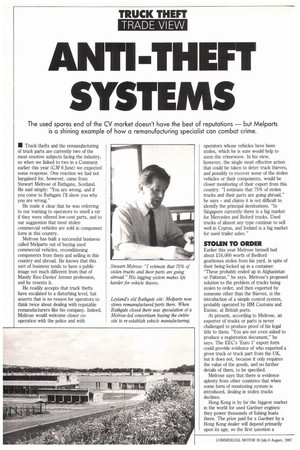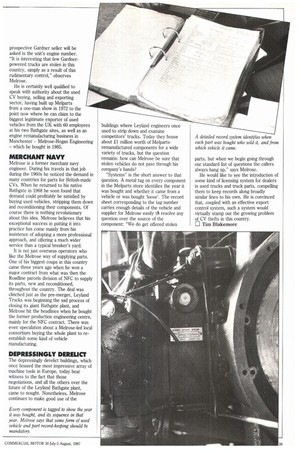ANTI THEFT SYSTEMS
Page 40

Page 41

If you've noticed an error in this article please click here to report it so we can fix it.
The used spares end of the CV market doesn't have the best of reputations — but Melparts is a shining example of how a remanufacturing specialist can combat crime.
• Truck thefts and the remanufacturing of thick parts are currently two of the most emotive subjects facing the industry, so when we linked to two in a Comment earlier this year (CM 6 June) we expected some response. One reaction we had not bargained for, however, came from Stewart Melrose of Bathgate, Scotland. He said simply: "You are wrong, and if you come to Bathgate I'll show you why you are wrong."
He made it clear that he was referring to our warning to operators to smell a rat if they were offered low-cost parts, and to our suggestion that most stolen commercial vehicles are sold in component form in this country.
Melrose has built a successful business called Melparts out of buying used commercial vehicles, reconditioning components from them and selling in this country and abroad. He knows that this sort of business tends to have a public image not much different from that of Mandy Rice-Davies' former profession, and he resents it.
He readily accepts that truck thefts have escalated to a disturbing level, but . asserts that is no reason for operators to think twice about dealing with reputable rernanufacturers like his company. Indeed, Melrose would welcome closer cooperation with the police and with operators whose vehicles have been stolen, which he is sure would help to stem the criinewave. In his view, however, the single most effective action that could be taken to deter truck thieves, and possibly to recover some of the stolen vehicles or their components, would be closer monitoring of their export from this country. "I estimate that 75% of stolen trucks and their parts are going abroad," he says — and claims it is not difficult to identify the principal destinations. "In Singapore currently there is a big market for Mercedes and Beford trucks. Used trucks of almost any type continue to sell well in Cyprus, and Ireland is a big market for used trailer axles."
STOLEN TO ORDER
Earlier this year Melrose himself had about £16,000 worth of Bedford gearboxes stolen from his yard, in spite of their being locked up in a container. "These probably ended up in Afghanistan or Pakistan," he says. Melrose's proposed solution to the problem of trucks being stolen to order, and then exported by someone other than the thieves, is the introduction of a simple control system, probably operated by HM Customs and Excise, at British ports.
At present, according to Melrose, an exporter of trucks or parts is never challenged to produce proof of his legal title to them. "You are not even asked to produce a registration document," he says. The EEC's 'Euro r export form could provide evidence of who exported a given truck or truck part from the UK, but it does not, because it only requires the value of the goods, and no further details of them, to be specified.
Melrose says that there is evidence aplenty from other countries that when some form of monitoring system is introduced, dealing in stolen trucks declines.
Hong Kong is by far the biggest market in the world for used Gardner engines: they power thousands of fishing boats there. The price paid for a Gardner by a Hong Kong dealer will depend primarily upon its age, so the first question a prospective Gardner seller will be asked is the unit's engine number. "It is interesting that few Gardnerpowered trucks are stolen in this country, simply as a result of this rudimentary control," observes Melrose.
He is certainly well qualified to speak with authority about the used CV buying, selling and exporting sector, having built up Melparts from a one-man show in 1972 to the point now where he can claim to the biggest legitimate exporter of used vehicles from the UK with 60 employees at his two Bathgate sites, as well as an engine remanufacturing business in Manchester — Melrose-Hogan Engineering — which he bought in 1985.
MERCHANT NAVY
Melrose is a former merchant navy engineer. During his travels in that job during the 1960s he noticed the demand in many countries for parts for British-made CVs. When he returned to his native Bathgate in 1968 he soon found that demand could profitably be satisfied by buying used vehicles, stripping them down and reconditioning their components. Of course there is nothing revolutionary about this idea. Melrose believes that his exceptional success in putting it into practice has come mainly from his insistence of adopting a more professional approach, and offering a much wider service than a typical breaker's yard.
It is not just overseas operators who like the Melrose way of supplying parts. One of his biggest coups in this country came three years ago when he won a major contract from what was then the Roadline parcels division of NFC to supply its parts, new and reconditioned, throughout the country. The deal was clinched just as the pre-merger, Leyland Trucks was beginning the sad process of closing its giant Bathgate plant, and Melrose hit the headlines when he bought the former production engineering centre, mainly for the NFC contract. There was even speculation about a Melrose-led local consortium buying the whole plant to reestablish some kind of vehicle manufacturing.
DEPRESSINGLY DERELICT
The depressingly derelict buildings, which once housed the most impressive array of machine tools in Europe, today bear witness to the fact that those negotiations, and all the others over the future of the Leyland Bathgate plant, came to nought. Nonetheless, Melrose continues to make good use of the buildings where Leyland engineers once used to strip down and examine competitors' trucks. Today they house about E1 million worth of Melpartsremanufactured components for a wide variety of trucks, but the question remains: how can Melrose be sure that stolen vehicles do not pass through his company's hands?
"Systems" is the short answer to that question. A metal tag on every component in the Melparts store identifies the year it was bought and whether it came from a vehicle or was bought 'loose'. The record sheet corresponding to the tag number carries enough details of the vehicle and supplier for Melrose easily t& resolve any question over the source of the component: "We do get offered stolen parts, but when we begin going through our standard list of questions the callers always hang up," says Melrose.
He would like to see the introduction of some kind of licensing system for dealers in used trucks and truck parts, compelling them to keep records along broadly similar lines to his own. He is convinced that, coupled with an effective export control system, such a system would virtually stamp out the growing problem of CV thefts in this country.
1=1 Tim Blakemore




















































































































